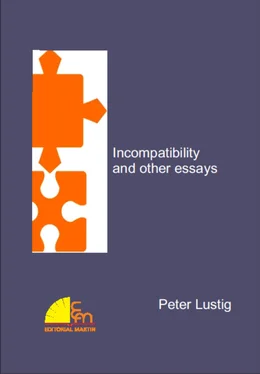Peter Lustig
Incompatibility and other essays
Editorial Martin 2020
Table of Contents
Half title
Incompatibility
Introduction
I. The Singularity of Selfhood
II. A Communal Identity
III. Political Delusions (Liberalism)
IV. The Warpath
V. The Turning Point of Historical Studies
VI. The Place for Nostalgia
VII. Literature Fades
VIII. Education cum Therapy
IX. Differentiation
X. Integration
XI. Authority and the People
XII. Intramural Confrontation
XIII. Human Nature
The Third World
I. The Concept of the Third World.
II. The Nation State
III. The Anglosphere
IV. The Test of Feasibility
V. Security
VI. The Rationality of Political Strategy
VII. The Best of Both Worlds
VIII. Good and Evil
IX. The Third World as the Outsider
X. Education
XI. Ideological Bias
XII. Critical Philosophy
XIII. The Validity of Conceptualization
XIV. An Afterthought
Liberty
Introduction
I.Liberty and Social Change
II. Salvation and Mental Health
III. Bigotry
IV. One World
V. The Clean Slate
VI. Science and Religion
VII. Liberty at the Antipodes
VIII. Free-thinking
IX. Way Out in the Deep Blue Sea
The Drawbacks of Majority Rule
I. The a 51% Myth
II. Leverage
III. The Welfare State
IV. Politics and Religion
V. Nationalism, Populism and Democracy
VI. The Rule of Law
VII. What if Not Democracy?
VIII. The Age of Liberal Democracy
| Lustig, PeterIncompatibility and other essays / Peter Lustig. - 1a ed. - Mar del Plata : Martín, 2020.Libro digital, EPUBArchivo Digital: descargaISBN 978-987-543-156-01. Filosofía Política. I. Título.CDD 320.01 |
© Peter Lustig
www.editorialmartin.com
EDITORIAL MARTIN - 2020
ARGENTINA
Primera edición en formato digital: diciembre de 2020
Versión: 1.0
Digitalización: Proyecto451
Queda rigurosamente prohibida, sin la autorización escrita de los titulares del “Copyright”, bajo las sanciones establecidas en las leyes, la reproducción parcial o total de esta obra por cualquier medio o procedimiento, incluidos la reprografía y el tratamiento informático.
First digital edition: december, 2020
All rights reserved. No part of this book may be reproduced or used in any manner, including reprography and computer usage, without written permission of the copyright owner.
Inscripción ley 11.723 en trámite
ISBN edición digital (ePub): 978-987-543-156-0
Incompatibility
Introduction
I. The Singularity of Selfhood
II. A Communal Identity
III. Political Delusions (Liberalism)
IV. The Warpath
V. The Turning Point of Historical Studies
VI. The Place for Nostalgia
VII. Literature Fades
VIII. Education cum Therapy
IX. Differentiation
X. Integration
XI. Authority and the People
XII. Intramural Confrontation
XIII. Human Nature
The fact that all the attempts designed to encompass the common interests of humanity have failed, up to a given point, suggests that certain dead ends must have been reached along the way, which were never taken sufficiently into account. Devising a workable strategy to deal fairly and comprehensively with the demands of society requires that those differences that have stood as insurmountable obstacles be defined and discussed at length, before they can be cast aside. This entails drawing up a list of all the known sources of conflict and checking out the reasons why they should have remained unsolved. Systematic failure needs to be traced to the inadequacy of the methods employed, bearing in mind that, although it must be accepted that all the solutions applying to human affairs can only be temporary, some tend to be more conclusive and durable than others and the difference depends only on how they were implemented. In brief, if upon close examination of irreconcilable positions it is found that these are based on unyielding beliefs and fiercely held convictions, coming to terms would call for a discussion as open and uncommitted as possible. Unless something sensible came out of such a discussion, liable to be put into practice, nothing of any consequence would have been attained. That is why a strategy and a method are necessary, given that good intentions alone will never do when it comes to bringing about a change in the hearts and the minds of folks who, for the most part, cannot be expected to make such an effort unaided.
Toward this end, work must proceed at two distinct levels: one to deal with the psychological aspects of personal and collective insecurity and the other, with the objective reality of history and its underlying driving forces. If these two realms of human concerns can be brought together, it can be said that one was on track; otherwise, the result could lead to unrelenting hostility and that, in turn, would make it obvious that nobody was in the least inclined to listen. The issue centring upon the individual and the circumstances would then have to be fought out.
The main purpose of this work is to show up the notion that fighting in order to uphold an idea is a form of behaviour both futile and irrational. Not only because of the ethical inconsistency involved in killing people to improve society, but because the outcome is left to chance, not reason. This should not be understood to mean that the use of force is to be rejected out of hand, as a matter of principle, such as pacifism would have it. But, as long as civilization is bent on making sure that individual freedom does not interfere with social restraints designed to favour solidarity, there will be conflicts of interest, some of which may appear unsolvable. Fighting will not change this, no matter which way it goes, as the world wars have proven, whenever a no win situation arose in the aftermath (which, of course, does not mean that anybody ought to have given up trying to win while the war was still on).
The ground for these wars was laid very thoroughly along theoretical lines. Afterwards, what came to the fore were certain priorities, out of necessity. Freedom never came into the picture, either during the fighting or after. Moreover, the unprecedented practical and humanitarian problems brought about by all out war led to the assessment that its causes had to be economic, and that it was safe to conclude that all the additional suffering that war had brought upon the world might be compensated for by reparations in kind. Reducing the concept of total war to that of a trade war is insubstantial and unworthy of comment. In fact, if the causes of the war were economic, they could be sorted out in the market, not the battlefield. There would be no need for any arms races. Yet, every denizen who qualifies for the draft is rated as a prospective soldier by the demographic statistics. Population figures are even being used as a dissuasive factor, before resorting to warfare, when it appears that the imbalance in manpower might be a deciding factor. (Why else would the U.S. have been reluctant to fight in Korea or South East Asia, while they held a conclusive advantage in industrial capacity and weaponry?) Alternately, as China had opened its economy, in the seventies, and its immense population was no longer regarded as a regional menace, one could hardly say that G.W.Bush’s initiative to integrate the Americas economically compares unfavourably with what is going on in Venezuela, Argentina or Bolivia under ideologically incompatible regimes, opposed to the U.S. for more than just economic reasons.
Читать дальше












